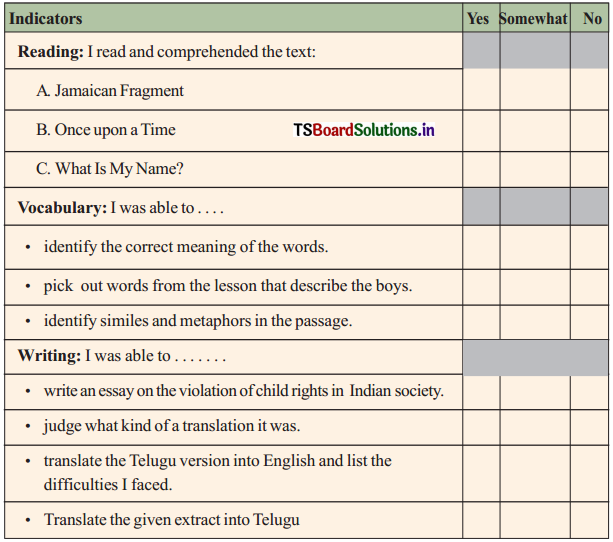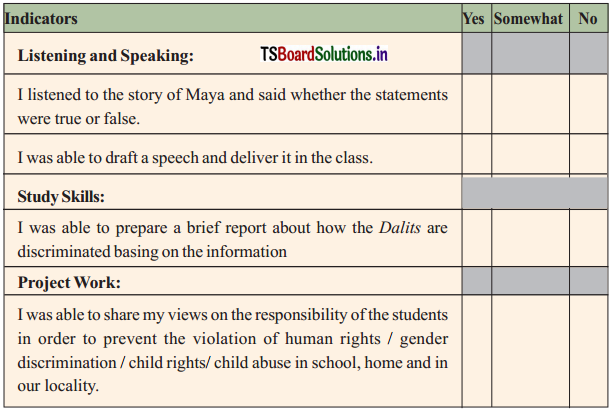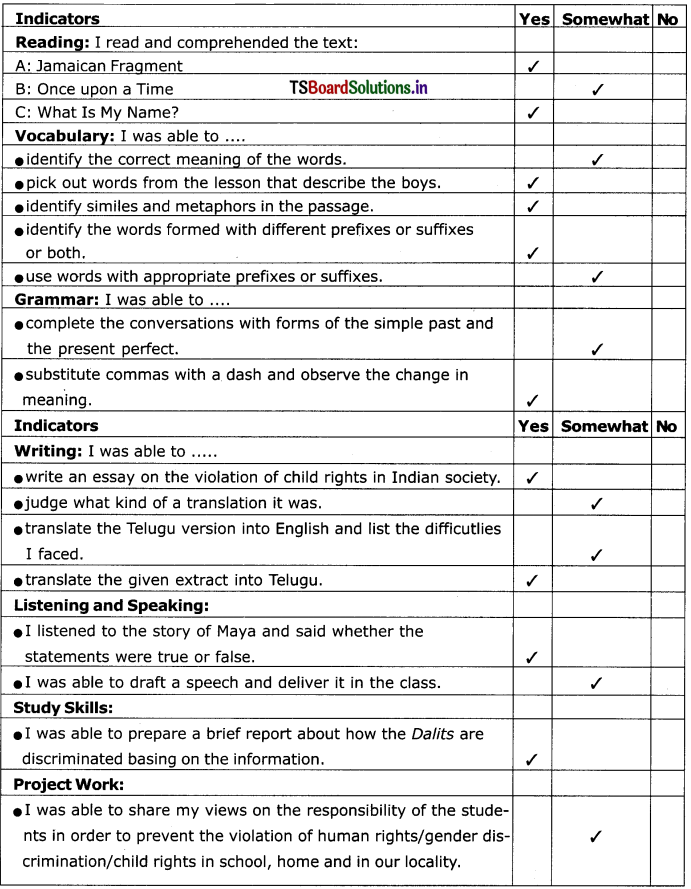Telangana SCERT TS 10th Class English Guide Pdf Unit 8C What is My Name? Textbook Questions and Answers.
TS 10th Class English Guide Unit 8C What is My Name?
Comprehension:
I. Answer the following questions.
Question 1.
What made Mrs. Murthy so restless to know her name ?
Answer:
In her scrubbing zeal Mrs. Murthy had forgotten her name. At once she felt that she had lost her own identity. She had lost her self-respect. That made her so restless to know her name.
Question 2.
Do you notice any change in Mrs. Murthy in the first picture and Sarada in the second picture ?
Answer:
Mrs. Murthy in the first picture is more traditional, cool and obedient. She seems to be much bold and energetic in the second one, as Sarada. She feels like a real person as she thinks that she has got her identity and self-respect.
Question 3.
Do you find any similarities between Mrs. Murthy and the women in your family ? If yes, list them.
Answer:
Yes, I find some similarities between Mrs. Murthy and my mother as well as my grandma. My mother and grandma are completely dedicated to the well being of the family like Mrs. Murthy. They totally confine themselves to the chores such as cleaning floors, washing clothes, cooking , looking after children etc. They don’t have any identity and know nothing about the world outside our home.
![]()
Question 4.
Why do you think the writer decided to focus on the question of married women’s identity ?
Answer:
The writer decided to focus on the question of married women’s identity because she wanted them to live with their own identity and self-respect. She did not want them to confine to their homes. She wanted them to be given equal rights, equal respect. She wanted that they should also assume some responsibility in nation building activity.
Question 5.
Which part of the story shows that Mrs. Murthy feels her identity restored ?
Answer:
In the last part of the story, when she returned to her husband’s house Mrs. Murthy feels her identity restored. It is clear from her word’s .. from now onwards don’t call meyemoi, geemoi. My name is Sarada – call me Sarada, understood ?”
Question 6.
Dowry was given in Sarada’s marriage. Is taking and giving dowry an offence? What are your thoughts on people offering and demanding dowry?
Answer:
Both taking and giving dowry is an offence. No one should demand dowry nor offer dowry. A person may give her daughter some money or jewellery. But it must not be at demand. It must be pleasing. Dowry is also against the constitution.
Question 7.
Make a list of activities/ professions. Find out about women and men in varied professions. Is there any job that only a woman or only a man can do? Discuss.
Answer:
List of activities or professions :
Lawyers, Doctors, Scientists, Entrepreneurs, Administrative Officers, Soldiers, Teachers, Politicians, Writers, Artists and such others.
There is not any job that only a woman or a man can do. Nowadays women are also doing all types of jobs.
![]()
Writing:
I. Translation:
Read the following news item in Telugu and compare it with its translation in English given after that.

The following is the translated version of the above Telugu news item.
Centre’s nod to Kasturi Rangan Committe Recommondations on Western Ghats
NEW DELHI:
The Ministry of Environment has accepted the report made by the Kasturi Rangan Committee on the conservation of Western Ghats. The committee, in its recommendations, made it clear that no further development activities be undertaken in the Western Ghats spread across the 60 thousand square kilometers in six states.
The committee was appointed by the Union Government and headed by Kasturi Rangan to suggest measures to conserve the rarest ecosystem of the Western Ghat forests. The committee submitted its Report on 15th of April. The Ministry of Environment, after taking opinions of the six state governments and the people of the states, accepted the recommendations. The Western Ghats extend in Gujarat, Maharashtra, Goa, Karnataka, Kerala and Tamil Nadu states.
![]()
Let’s think of the following.
1. Do you think that translation is just translation of language ? Or does it also include translation of ideas ?
2. Which translation is better true translation or free translation ?
3. Do you find any change in the order of the sentence? For e.g: We have Subject, Verb, Object in English but the order is Subject, Object, Verb in Telugu.
4. Do you think sometimes it creates problems in the choice of vocabulary while attempting to translate a text ?
5. Is it possible to translate a poem from one language to the other ?
6. Is it necessary to take cultural aspects into consideration ?
Answer:
1. No. I don’t think that translation is just a translation of language. It includes linguistic, pragmatic and cultural elements. A literary translation must reflect the imaginative intellectual and intuitive writing of the author. Literary translation must reflect all the literary features of the source text such as sound effects, selection of words, figures of speech, etc.
2. The true translation keeps the original message sufficient without its form and word order changed. While the free translation aims at the message adequately represented paying little attention to the form or order. The method we should employ depends on the form of the text we are to translate. Often the combination of the two methods works better.
3. Yes, I do.
4. Yes, I do.
5. Yes, it is possible.
6. Yes, it is necessary.
Now, take a paragraph in Telugu from your text book/ magazine and translate it into English. List the difficulties while translating the text.
ఎవరీ అబ్బాయి? అతని పేరు నరేంద్రనాథ్. అందరూ నరేన్ అని పిలిచేవారు. అతడే తరవాతికాలంలో విశ్వవిఖ్యాతినొంది సింహసదృశమైన మనోబలానికి ప్రతిరూపమై భారతదేశ యువజనులందరికీ ఆదర్శమై నిలిచిన శ్రీ వివేకానందస్వామి. ఈయన జన్మదినమైన జనవరి 12వ తేదీన మన దేశ ప్రజలంతా జాతీయ యువజన దినోత్సవంగా పండుగ జరుపుకొంటారు. నరేన్ తండ్రి శ్రీ విశ్వనాథ్ దత్త. మంచి పేరున్న వకీలు. ఎంతో చదువుకున్నవాడు. అందరి గౌరవాన్నీ పొందేవాడు. తల్లి భువనేశ్వరీదేవి. రూపంలోను, ప్రవర్తనలోను ఒక రాణిని ఉండేది. అందరూ ఆ తల్లిని ప్రేమించేవారు, గౌరవించేవారు.
Who is this boy ? His original name is Narendranath. All used to call him Naren. He is none other than the person Sri Vivekananda Swami, who became ideal to all Indian youth, by his will-power like that of lion and became world famous, later on. All Indians celebrate his birthday, 12th January as National Youth Day. The father of Naren was Sri Viswanath Datta, a famous lawyer, well educated and respected by all. Mother was Bhuvaneswari. She was like a queen in her appearance and behaviour. All loved and respected her.
Some difficulties while translating the text:
Translation is the replacement of textual material in one language (Source Language by equivalent textual material in another language (Target Language).
- removing arbitrarily through paraphrasing is very difficult.
- Selecting suitable words and phrases to translate the meaning along with its feeling is a difficult task.
- A translator must distinguish between formal/ informal, fixed expression or personal expressions.
- Finding the idiomatic expressions and translating them into other language is the most difficult as every language has its own idiomatic expressions.
Question 3.
Translate the following extract into Telugu and compare it with the original story in Telugu. (Refer to teacher’s handbook for Telugu version.)
‘Sarada! My dear Sarada!’ she shouted and embraced her. The housewife felt like a person — totally parched and dried up, about to die of thirst — getting a drink of cool water from the new earthen kooja poured into her mouth with a spoon and given thus a new life. The friend did indeed give her a new life — ‘You are Sarada. You came first in our school in the tenth class. You came first in the music competition conducted by the college. You used to paint good pictures too. We were ten friends altogether — I meet all of them some time or other. We write letters to each other. Only you have gone out of our reach! Tell me why are you living incognito?’ her friend confronted her.
Answer:
“శారదా, నా ప్రియమైన శారదా” అంటూ అరచి ఆ అమ్మాయిని (తన స్నేహితురాలైన గృహిణిని కౌగిలించుకుంది. ఆ గృహిణి దాహంతో ఎండిపోయి చనిపోబోతున్నప్పుడు క్రొత్త కుండలోంచి చల్లని నీటిని చెంచాతో తన నోటిలో పోస్తే క్రొత్త జీవితాన్ని పొందిన వ్యక్తివలె అనుభూతి చెందింది. “నీవు శారదవు. నీవు పదవ తరగతిలో మన స్కూల్ ఫస్ట్ వచ్చావు. కాలేజీలో జరిగిన సంగీత పోటీలలో నీవు ప్రథమురాలుగా వచ్చావు. నీవు మంచి బొమ్మలు కూడా వేసేదానివి. మనమంతా సుమారు పదిమంది స్నేహితులము. వాళ్ళందర్నీ నేను ఎప్పుడో ఒకప్పుడు కలిశాను. మేము ఒకళ్ళకు ఒకళ్ళము ఉత్తరాలు రాసుకుంటూ ఉంటాము. నీవు మాత్రమే మాకు అందుబాటులో లేకుండా పోయావు. నీవు అజ్ఞాతంగా ఎందుకుంటున్నావో చెప్పు” అని నిలదీసిన ఆ స్నేహితురాలు గృహిణికి నిజంగానే క్రొత్త జీవితాన్ని ఇచ్చింది.
This chapter talks about human rights from a different perspective. Let us now understand the rights of children to keep them safe through the following section:
![]()
Speak for Safety:
Here is a conversation that Tony had with his mother.
Mother : Tony, why are you so irritable these days? Even the next door aunty was telling me that you have stopped going over to help her as you usually do.
Tony : It’s nothing! I don’t want to talk about it.
Mother : No Tony, I feel you are worried about something. Talking about our troubles helps us feel better.
Tony : (Hesitantly) I would like to. But I think it might upset you.
Mother : (Sitting down next to him) It’s not about me, Tony. We need to figure out what the problem is and find a solution.
Tony : Well. It is about the aunty next door. I had gone to her house to give the clothes she had asked me to collect from the dhobi. She asked me to put the clothes in the top shelf of the inside cupboard.(Tony then stops…)
Mother : (Gently) I see.
Tony : Well… she was standing very close to me. It made me feel uncomfortable. And when I tried to move away, she held me back.I did not like it but she would not let go of me. I got away. But it has been bothering me ever since.
Mother : Tony, it is really brave of you to tell me this. Aunty has behaved in an unsafe manner. I will talk to her about it this evening.
Tony : What if she denies it and gets angry with us?
Mother : I know you are telling the truth and I believe you.
Tony : I am a big boy now, may be I should have done something to stop it. I feel ashamed.
Mother : But it’s not your fault! You did not break any rules. The person who breaks the rule is to be blamed. She is the one who needs to feel ashamed, not you. Our laws – like the POCSO Act, prescribe punishment for such offences.
![]()
Questions for discussion:
Question 1.
What makes this issue sensitive? What are the different ways to handle such issues?
Answer:
The young woman standing close to the grown up boy and holding him back when he tried to move away makes the issue sensitive. To handle such issues, we have to consult with our elders like parents or teachers who can guide us in a right path.
Question 2.
Always seek help. Do you think the boy was correct? How do you support?
Answer:
Yes, the boy was correct. We should accept that he was wise because he sought the help of his own mother, who was the most trusted.
Project Work:
(a) Collect paper clippings that appeared in daily newspapers over a period of fifteen days or so that depict gender discrimination/violation of human rights/child rights. Paste them on a chart and display the chart in the class.
Answer:
Student’s Activity.
(b) Work in groups and discuss what specific actions you as students can take to stop the violation of human rights/gender discrimination/child rights in school, home and in the locality where you live.
Answer:
Group Work:
Group 1: I (we) will treat all our students equally.
Group 2: We will organize seminars, meetings etc. on the violation of human rights and how to prevent such violation.
Group 3 : We won’t ill treat any body because of their caste religon and gender.
Group 4: We will arrange meetings in our neighbourhood and bring awareness among the people about gender discrimination.
Group 5: We will take the support from community to stop the violation of human rights/gender discrimination/child rights.
Group 6 : We will lodge complaints against such incidents.
![]()
Self Assessment:
How well have I understood this unit?
Read and tick (✓) in the appropriate box.


![]()
Answer:

![]()
What is My Name ? Summary in English
The author deals with a common scenario that the women in India face – even forgetting their name. Their names are not given much importance. Right from the childhood, they are called with many common names like ammayi, ammadu, amma and so on. Their real name doesn’t has much importance.
The story deals with a lady, who after watching the name board of a lady in her neighbourhood, started thinking about her own name. She couldn’t remember that. She tried to take the help of anyone-the servant, her children, her neighbour and even her husband. But no one could help her. At last she went to her parental home, to check in the certificates as it is mandatory that they hold her name. But her mother told her that her certificates were kept on the attic and they would search them the next day and asked her to take her meal.
When she met her college mate and friend that friend called her by name with affection and talks with her.
After returning home, she found the certificates and prizes.
Taking them she went to her own home. She told her husband to call her by Sarada not by “yemoi, geemoi”. She sat there on the sofa which has not been dusted and started showing her children the album and paintings of her childhood.
About the Author:
Smt P. Satyavathi is one of those writers who have brought feminism to the peak in Telugu literature. Though she is a retired English lecturer, she has great understanding of the Telugu accent and the idiom of the respective regions. She is adept in portraying human experience universally.
The technique of appealing to the readers by weaving the story wonderfully with a philosophical touch and theological aspect is her forte. She has published four anthologies of short stories, five novels and a collection of essays. She has won a number of prestigious awards. This story “What Is My Name” is originally published as “Illalakagaane Pandagouna” in Telugu in 1990 and has been translated into almost all the south Indian languages and Hindi.
![]()
Glossary:
perturb (v) = make someone anxious, agitated or worried;
mistress (n) = A woman who has control, power and authority of a house;
daubing (n) = the act of spreading a substance such as mud thickly;
immerse (v) = absorb oneself in something;
giggling (v) = laughing nervously;
anguish (n) = to cause to suffer severe mental distress.
frantically (adv) = worriedly/anxiously;
maternity home (n.phrase) = house of one’s parents (especially a woman’s);
attic (n) = a part of a house under the roof;
parched (adj) = very dry;
choultry (n) = a resting place for visitors;
incognito = having a concealed identify;
fish (v) = search;
sacred (adj) = holy
knots (v) = tying two ends of rope
tucked (v) = pushed
mission (n) = particular work to do
query (n) = a question
maid servant (n) = a lady servant
immersed (adj) = completely covered
urge (n) = impulse
anguish (n) = severe pain
bothered (v) = spent time or energy
chore (n) = household duties
strain (n) = pressure
embraced (v) = hugged
confronted (v) = faced